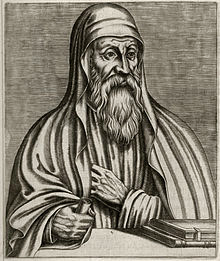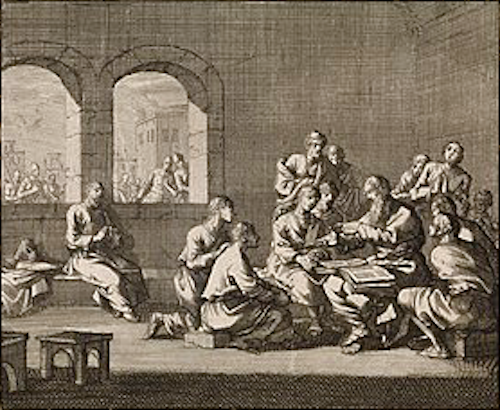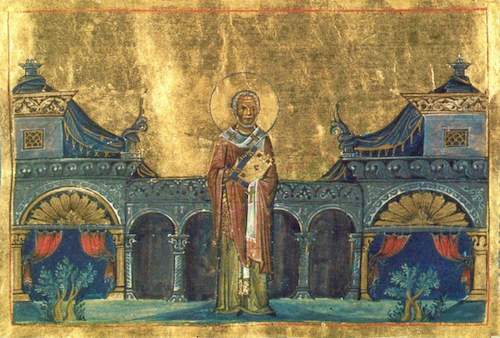“For there are some eunuchs, which were so born from their mother’s womb: and there are some eunuchs, which were made eunuchs of men: and there be eunuchs, which have made themselves eunuchs for the kingdom of heaven’s sake. He that is able to receive it, let him receive it.” Matthew 19:12 (KJV)

Before the Edict of Milan in 313 giving Christians the religious freedom to worship their God, the brilliant and most gifted of the Early Church Fathers was Origen (184—253 AD), a contemporary of Tertullian (160—220 AD) who had argued for “religious freedom.”
In Contra Celsus (Against Celsus) Origen, called “The Genius of the Early Church,” broached the idea of religious freedom in a more subtle way. He makes it clear to Rome and his readers that Christianity will not owe its victory to coercion but to the power of truth. He explains how Jesus draws men to Him rather than forces men to Him:
“…this man (Jesus), in addition to His other merits, is an object of admiration both for His wisdom, and for His miracles, and for His powers of government. For He persuaded some to withdraw themselves from their laws and to secede to Him, not as a tyrant would do, nor as a robber who arms his followers against men; nor as a rich man, who bestows help upon those who come to him; nor as one of those who confessedly are deserving of censure; but as a teacher of the doctrine regarding the God of all things, and of the worship which belongs to Him, and of all moral precepts which are able to secure the favor of the Supreme God to him who orders his life in conformity therewith.” 1.30
Unlike Tertullian, Origen was raised in a Christian home in Alexandria. In his teens, his father Leonides and many other Alexandrians were imprisoned under the persecutions of Emperor Severus (192-211). The impetuous young Origen was ready to follow his father into prison, but his mother hid all his clothes. His father and others were beheaded and had their properties confiscated. Origen had to provide for the family.

The young Origen became a teacher to support his mother and six younger brothers. Over the years his Catechetical School in Alexandria (below) and later his school in Caesarea became renowned for scholarship and attracted many young philosophers, some of whom were martyred. The Catechetical School in Alexandria (open to pagans, Christians, men and women) became famous under the the encyclopedic teachings of Origen nicknamed Adamantios” meaning “Man of Steel” because of the force of his arguments.
The Catechetical School in Alexandria (open to pagans, Christians, men and women) became famous under the the encyclopedic teachings of Origen nicknamed Adamantios” meaning “Man of Steel” because of the force of his arguments.
Origen devoted himself to study and self-denial. When he was continually plagued by lust for women, he had himself castrated, an act known as an orchiectomy. Eusebius, the first and greatest Early Church historian, says of this young man’s act:
“While Origen was teaching in Alexandria, he did something that gave proof enough of his young and immature mind, but also of his faith and self-control. He took the saying, ‘There are those who have made themselves eunuchs for the kingdom of heaven’s sake’ (Matthew 19:12) in too literal and absurd a sense and he was eager to fulfill the Savior’s words and also to forestall any slander on the part of unbelievers for despite his youth, he held forth on religious matters before women as well as men. So he quickly carried out the Savior’s words, trying to do so unnoticed by most of his students. But however much he wished it, he could not possibly hide such a deed. Demetrius learned of it later, since he presided over the community there. He was astonished at Origen’s rash act.” Church History 6.8
Surgical castration is bilateral orchiectomy (removal of both testes). It drastically reduces the production of testosterones. In male animals it is called spaying or neutering.
Origen’s youthful and reckless audacity gave way over the years to a mature and disciplined mind. He produced a body of over 6,000 works that laid a firm foundation for Christian theology, apologetics and homiletics. Origen, one of history’s most genius of minds had no distractions. A small list of some of Origen’s works are listed below.—Sandra Sweeny Silver
• Roberts-Donaldson English Translation: Origen de Principiis • Roberts-Donaldson English Translation: Origen de Principiis: Preface • Roberts-Donaldson English Translation: Origen de Principiis: Book I • Roberts-Donaldson English Translation: Origen de Principiis: Book II • Roberts-Donaldson English Translation: Origen de Principiis: Book III • Roberts-Donaldson English Translation: Origen de Principiis: Book IV • Roberts-Donaldson English Translation: A Letter to Origen from Africanus About the History of Susanna • Roberts-Donaldson English Translation: A Letter from Origen to Africanus • Roberts-Donaldson English Translation: A Letter from Origen to Gregory • Roberts-Donaldson English Translation: Origen Against Celsus: Book I • Roberts-Donaldson English Translation: Origen Against Celsus: Book II • Roberts-Donaldson English Translation: Origen Against Celsus: Book III • Roberts-Donaldson English Translation: Origen Against Celsus: Book IV • Roberts-Donaldson English Translation: Origen Against Celsus: Book V • Roberts-Donaldson English Translation: Origen Against Celsus: Book VI • Roberts-Donaldson English Translation: Origen Against Celsus: Book VII • Roberts-Donaldson English Translation: Origen Against Celsus: Book VIII • Roberts-Donaldson English Translation: Origen on Prayer • Roberts-Donaldson English Translation: Prologue of Rufinus • Roberts-Donaldson English Translation: Commentary on the Gospel of John: Book I
